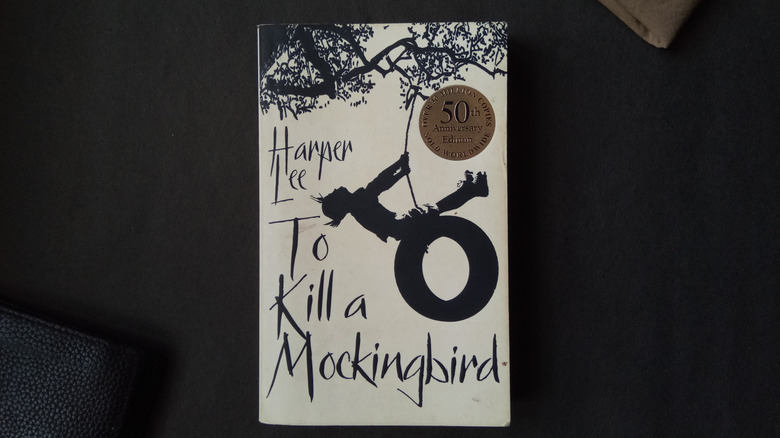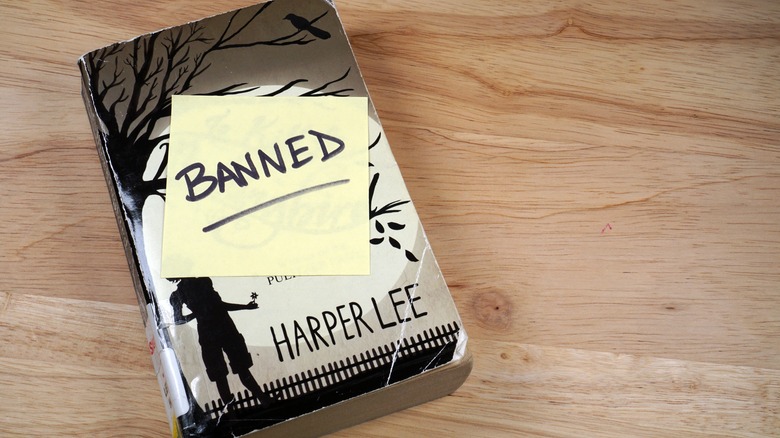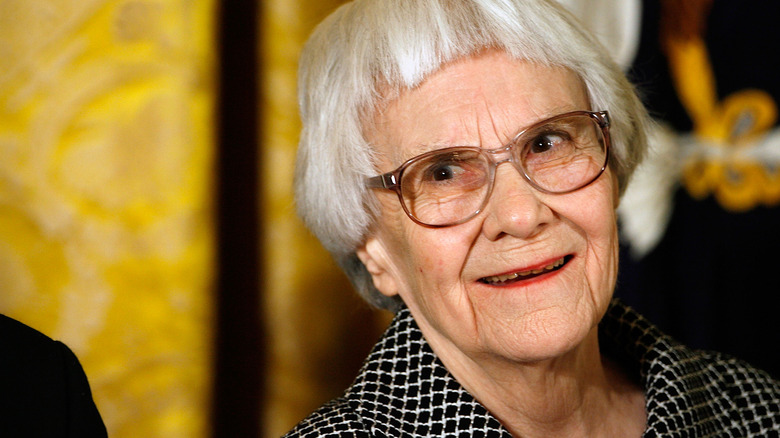The Real Reason To Kill A Mockingbird Became A Banned Book
Trigger warning: The following article contains language regarding assault, racist ideology .
"Shoot all the bluejays you want, if you can hit 'em, but remember it's a sin to kill a mockingbird," Atticus Finch tells his daughter Jean Louise "Scout" Finch in the book "To Kill a Mockingbird" by Harper Lee. This is probably one of the most important lessons little Scout learns — never take advantage of someone weaker than you.
The Pulitzer Prize-winning book is much-loved for many reasons, primary of which is the story-telling that follows the innocent child-like worldview of the almost 6-year-old Scout. She goes through life in sleepy Maycomb, Alabama learning valuable lessons from her wise lawyer-father Atticus and her own experiences (via SparkNotes).
"To Kill a Mockingbird" continues to sell one million copies a year, and has been translated into over 40 languages, according to The Straits Times. By detailing Atticus' quiet strength in defending a black man — Tom Robinson — who is standing trial for being falsely accused of raping a white woman, the book discusses important themes like racial prejudice and doing the right thing no matter the consequence. In Atticus' case, the consequence is the ridicule of the residents in the town he calls home. Despite its famed reception, the book is not without controversy; in fact, much like with J.D Salinger's "The Catcher in the Rye," "To Kill a Mockingbird" has been banned and challenged in various schools numerous times.
The book faced criticism over its language and reception
James LaRue, the director of American Library Association's Office for Intellectual Freedom, thinks that the controversy surrounding the Harper Lee classic has to do with its strong language, content that portrays "sexuality and rape," and "the use of the n-word" (via History). In what he thinks is a flimsy further argument, the book has also come under fire by The Biloxi School Board for simply making people uneasy. LaRue, speaking to History, said, "The whole point to classics is they challenge the way we think about things."
The most recent episode of banning happened in the Burbank California Unified School District, when the book was pulled from the schools' programs because parents complained about its racist language, according to Marshall University.
In a 2017 incident, the book — whose audio version was narrated by Reese Witherspoon – came under fire by a mother who was worried the use of the n-word would adversely impact her daughter. This happened in Biloxi, Mississippi; the book was banned from the 8th-grade syllabus but was later added back into the program, with the condition that it could be read under parental supervision, per Banned Books.
Author Harper Lee herself challenged this ban
In 1966, author of "To Kill a Mockingbird" Harper Lee herself (who's known for having led a reclusive life, per The Straits Times), challenged a Hanover County, Virginia school's decision to remove her book from their curriculum because it was "immoral," per History.
She wrote a bold and witty letter to Richmond News Leader, in which she claimed that the only explanation she could think of for such a claim on her book was that the board members at the Hanover County School couldn't read. "To hear that the novel is 'immoral' has made me count the years between now and 1984, for I have yet to come across a better example of doublethink," wrote Lee. She even ended the note with a donation so the members of the board could register for first grade reading lessons.
The school eventually reversed its decision.


